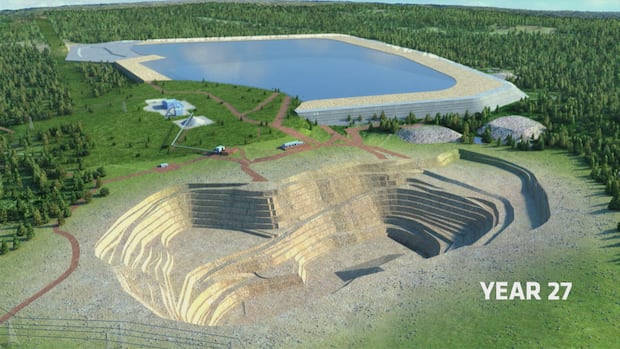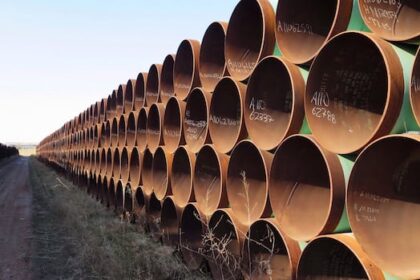New Brunswick·NewNew Brunswick industry is likely to get a boost from the federal budget introduced Tuesday, Premier Susan Holt suggests.Sisson Mine project touted by Premier Susan Holt comes at a good time, mining group saysSam Farley · CBC News · Posted: Nov 05, 2025 10:12 AM EST | Last Updated: 18 minutes agoListen to this articleEstimated 5 minutesNew Brunswick’s Sisson Mine project, proposed and approved a decade ago with no action, could get traction with the latest federal budget. (Sisson Mining Ltd. )New Brunswick industry is likely to get a boost from the federal budget introduced Tuesday, Premier Susan Holt suggests.Holt highlighted investments in critical infrastructure and trade infrastructure as “positive steps for New Brunswick” in a statement she made after the first budget of Prime Minister Mark Carney’s Liberal government was delivered.She went on to say her government will be looking to work with federal partners to ensure the Sisson Mine project and the ports of Belledune and Saint John “get the investments they need to power our economy.” The Sisson Mine has been a long-debated project to mine tungsten in a remote area near Napadogan and Stanley, roughly 50 kilometres northwest of Fredericton. A private company received provincial approval for the mine in 2015 and federal approval in 2017, but the project hasn’t gone ahead yet. The project drew opposition from environmental and Indigenous groups in the province. Tungsten, which is resistant to heat, wear and corrosion, is used in alloys for military applications, engines and turbines.While tungsten prices slumped at the time of the mine’s approval, the federal budget proposed adding the tungsten to the list of critical minerals eligible for a mining and exploration tax incentive for investors. Pierre Gratton, president of the Mining Association of Canada, said the Sisson Mine could be well-positioned now, given how the budget approaches funding for mines. (Mining Association of Canada)Pierre Gratton, president of the Mining Association of Canada, called the budget “very favourable” for his industry, with many incentives that could help spur new growth.“There’s significant dollars allocated to support infrastructure investments and that can be a barrier to new projects,” Gratton said, and the tax benefits would hopefully “spur more exploration and hopefully more mines.”Gratton said much of Canada’s mining potential is in the North, where the population is less dense, but New Brunswick is a “historic mining district.”“I think this will certainly help attract new investment into the New Brunswick mining sector for sure,” Gratton said of the budget. Gratton said that China has tended to monopolize tungsten production, but the new budget includes a fund for supporting critical mining projects facing such vulnerabilities.The budget included $2 billion to Natural Resources Canada to “make strategic investments in critical minerals projects and companies.”“I would say that the Sisson Mine could very well be one of those that would be eligible for that kind of support,” Gratton said. “We need to wean ourselves off our reliance on China. So it’s a well-positioned project.”New Brunswick’s much more established forestry sector, which has struggled under the trade war, also stands to benefit from the federal budget, said Derek Nighbor, president of the Forest Products Association of Canada. While the main priority is having Canada negotiate a trade deal with the United States, Nighbor said a second priority “is ensuring that in the interim, that our employees and our sector and our businesses are protected through backstop funding programs.”Derek Nighbor, president of the Forest Products Association of Canada, said funding in the budget to support the industry is welcome, but more is needed long term. (Sam Farley/Zoom)Included in the budget is $700 million in support for companies to maintain and support operations and restructuring during “this period of transformation.”The budget also included $500 million for market and product diversification in the forestry industry and a commitment to “prioritize Canadian materials in construction.” Companies contracting tenders with the federal government would also be required to source Canadian lumber.Nighbor said New Brunswick forestry hasn’t seen the layoffs that the industry has in British Columbia and Quebec.“That said, at a 45 per cent duty tariff combination, if this continues to drag, it’s inevitable that we will see impacts in New Brunswick.”Recently, New Brunswick Natural Resources Minister John Herron said he would support a cap on softwood to secure a tariff deal with the U.S. to help alleviate the current 45 per cent in U.S. surcharges on lumber being shipped across the border.When asked about this, Nighbor declined to “negotiate publicly,” but said “we need a number of creative ideas at the fingertips of negotiators to try to get us to the right place.”With certain industries celebrate budget wins, a nonpartisan Canadian conservation group said the budget was disappointing.There should have been more investments in climate action, but instead the budget included an intention to eliminate the oil and gas emissions cap, said Samanatha Green, incoming president of the Canadian Associations of Physicians for the Environment.“The government is not putting the well-being of people ahead of these high-level investments in industry,” said Green, a family doctor in Toronto who has previously run for the NDP.“Which frankly, is not going to benefit Canadian workers. It’s going to benefit shareholders of these large companies.”ABOUT THE AUTHORSam Farley is a Fredericton-based reporter at CBC New Brunswick. Originally from Boston, he is a journalism graduate of the University of King’s College in Halifax. He can be reached at sam.farley@cbc.ca
Mining, forestry industries in N.B. could benefit from federal budget











